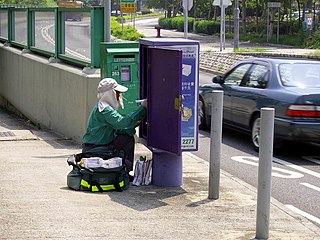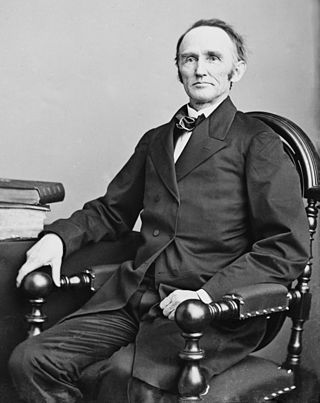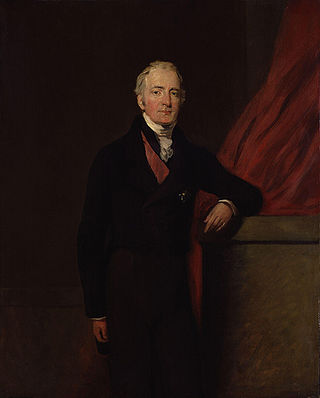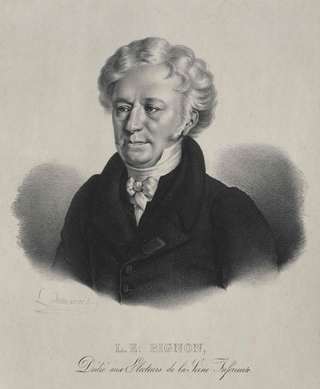
A post office is a public facility and a retailer that provides mail services, such as accepting letters and parcels, providing post office boxes, and selling postage stamps, packaging, and stationery. Post offices may offer additional services, which vary by country. These include providing and accepting government forms, and processing government services and fees. The chief administrator of a post office is called a postmaster.

The mail or post is a system for physically transporting postcards, letters, and parcels. A postal service can be private or public, though many governments place restrictions on private systems. Since the mid-19th century, national postal systems have generally been established as a government monopoly, with a fee on the article prepaid. Proof of payment is usually in the form of an adhesive postage stamp, but a postage meter is also used for bulk mailing.

The United States Post Office Department was the predecessor of the United States Postal Service, established in 1792. From 1872 to 1971, it was officially in the form of a Cabinet department. It was headed by the postmaster general.

A postcard or post card is a piece of thick paper or thin cardboard, typically rectangular, intended for writing and mailing without an envelope. Non-rectangular shapes may also be used but are rare.

Postmaster General of the United Kingdom was a Cabinet ministerial position in HM Government. Aside from maintaining the postal system, the Telegraph Act 1868 established the Postmaster General's right to exclusively maintain electric telegraphs. This would subsequently extend to telecommunications and broadcasting.

Louis-Eugène Cavaignac was a French general and politician who served as head of the executive power of France between June and December 1848, during the French Second Republic.

Postal history is the study of postal systems and how they operate and, or, the study of the use of postage stamps and covers and associated postal artifacts illustrating historical episodes in the development of postal systems. The term is attributed to Robson Lowe, a professional philatelist, stamp dealer and stamp auctioneer, who made the first organised study of the subject in the 1930s and described philatelists as "students of science", but postal historians as "students of humanity". More precisely, philatelists describe postal history as the study of rates, routes, markings, and means.

Montgomery Blair was an American politician and lawyer from Maryland. He served in the Lincoln administration cabinet as Postmaster-General from 1861 to 1864, during the Civil War. He was the son of Francis Preston Blair, elder brother of Francis Preston Blair Jr. and cousin of B. Gratz Brown.

Henry Bathurst, 3rd Earl Bathurst, was a High Tory, High Church Pittite. He was an MP for thirty years before ennoblement. A personal friend of William Pitt the Younger, he became a broker of deals across cabinet factions during the Napoleonic era. After the Napoleonic Wars, Bathurst was on the conservative wing of the Tory party.

John Cam Hobhouse, 1st Baron Broughton,, known as Sir John Hobhouse, Bt, from 1831 to 1851, was an English politician and diarist.

Louis Pierre Édouard, Baron Bignon was a French diplomat and historian.
Postal interception is the act of retrieving another person's mail for the purpose of either ensuring that the mail is not delivered to the recipient, or to spy on them.
A black room is part of a communication center used by state officials to conduct clandestine interception and surveillance of communications. Typically, all letters or communications pass through the black room before being passed to the recipient. This practice had been in vogue since the establishment of postal and telegraph services, and was frequently used in France by the ministers of Louis XVIII and his followers as the cabinet noir.

The Postal Service Act was a piece of United States federal legislation that established the United States Post Office Department. It was signed into law by President George Washington on February 20, 1792.

Postal censorship is the inspection or examination of mail, most often by governments. It can include opening, reading and total or selective obliteration of letters and their contents, as well as covers, postcards, parcels and other postal packets. Postal censorship takes place primarily but not exclusively during wartime and periods of unrest, and occasionally at other times, such as periods of civil disorder or of a state of emergency. Both covert and overt postal censorship have occurred.

The secrecy of correspondence or literally translated as secrecy of letters, is a fundamental legal principle enshrined in the constitutions of several European countries. It guarantees that the content of sealed letters is never revealed, and that letters in transit are not opened by government officials, or any other third party. The right of privacy to one's own letters is the main legal basis for the assumption of privacy of correspondence.

The General Post Office (GPO) was the state postal system and telecommunications carrier of the United Kingdom until 1969. Established in England in the 17th century, the GPO was a state monopoly covering the dispatch of items from a specific sender to a specific receiver ; it was overseen by a Government minister, the Postmaster General. Over time its remit was extended to Scotland and Ireland, and across parts of the British Empire.

Olivier Émile Ollivier was a French statesman. Starting as an avid republican opposed to Emperor Napoleon III, he pushed the Emperor toward liberal reforms and in turn came increasingly into Napoleon's grip. He entered the cabinet and was the prime minister when Napoleon fell.
Abel Tassin d'Alonne was a Dutch courtier and diplomat, who was private secretary of Mary II of England, William III of England, and Anthonie Heinsius, and played a secret role as the chief of Heinsius' Cabinet noir and as a cryptographer of note.
François Jaupain was the Director-general of the postal system in the Southern Netherlands between 1706 and 1725, which position he used to sell information to the Allied side in the War of the Spanish Succession and to act as a spymaster in the service of the Governor-General of the Austrian Netherlands Prince Eugene of Savoy.















